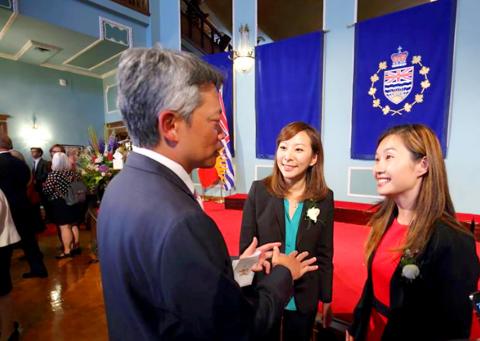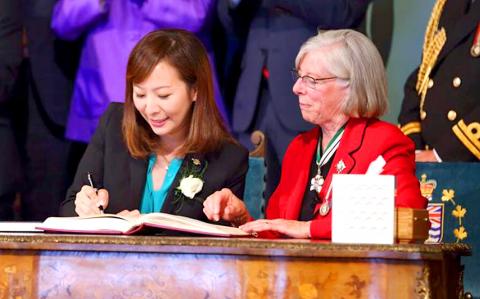Watching her father work long hours as a former Taichung city councilor, the last thing Katrina Chen (陳葦蓁) wanted to be was a politician. It was normal to watch him rush off at odd hours such as 2am to intervene in traffic accidents. Visitors seeking assistance filled his office on the ground floor of their family home and the phone could go off at any hour.
“My dad was in poor health because of all the work campaigning. He did not spend a lot of time with us. Even my mom sacrificed a lot of her time just helping out my dad,” Chen recalls in her sparsely furnished new office a few days before her official swearing-in as member of British Columbia, Canada’s Legislative Assembly and minister of state for child care.
MAKING HISTORY

Photo courtesy of New Democratic Party
Chen and fellow New Democratic Party (NDP) candidate Anne Kang (康安禮) made history on May 9 when both became the first Taiwan-born members of British Columbia’s legislative assembly. It was a moment of pride for the western province’s sizable Taiwanese immigrant communities presiding mainly in Vancouver, Burnaby and Richmond.
The two are serving different Burnaby communities after a contested election that ousted the ruling British Columbia Liberal Party after 16 years in power. NDP leader John Horgan also handed Chen a post in his cabinet as the minister of state for child care and designated Kang as parliamentary secretary for seniors.
Chen’s career path did not come without challenges, starting with being raised in a “high-discipline” family in which her parents physically punished her to instill manners. But as long as she demonstrated good character, they allowed her to explore her interests in literature, music and English. Struggling with the Taiwanese education system and the college entrance exams, a 17-year-old Chen moved to Canada in 2000 so she could focus on subjects she excelled at.

Photo courtesy of New Democratic Party
After graduation, Chen had her heart set on working for nonprofits and zeroed in on gender equality and human rights issues, but she ended up settling for a minimum wage at the grassroots organization ACORN (Association of Community Organizations for Reform Now) rallying around issues like homelessness, community cleanliness, and poverty. Through local Taiwanese connections, Chen became familiar with area politicians and found work as a constituency assistant under both federal and provincial officials before running for office.
CHALLENGES AS WOMEN
Chen and Kang have established a friendship around their roles as young mothers in a demanding role.

Photo courtesy of Anne Kang
Kang recalls the toll of campaigning immediately after giving birth from 2007 to 2008 when she launched her political career as a candidate for Burnaby’s city councilor. In between the first and second municipal elections, she had a second child. Aside from grappling with balancing motherhood and public service, Kang acknowledges that she has encountered double standards based on gender and age.
“Women need to exert extra effort to be heard or to be recognized,” she says. “I felt that I had to be stronger and articulate louder. I had to fight for my chance to speak and my chance to be recognized in a public setting whereas [if it were] your typical Caucasian man walking in, people would say, ‘Oh, welcome councilor.’ That was never given to me as a gift.”
Born in 1977 in Changhua in an agrarian town to preschool teacher mother and a father who was the local church pastor, Kang’s life revolved around the church and Christian teachings that emphasized the value of giving back to the community.

Photo courtesy of Katrina Chen
That didn’t change when her family uprooted to Canada in 1984 where her father continued ministering. As she watched her father counsel people with difficulties fitting in at school or with marriage and immigration problems, their grateful responses left a lasting impression on Kang.
Like Chen, politics was not on Kang’s radar. She was determined to be the a “patient” and “courageous” teacher, not unlike the ones she first encountered as a newcomer to Canada.
But after serving in a variety of organizations such as heading the Taiwanese Heritage Association as a founding director, she realized that policymaking would broaden her capacity.

Photo courtesy of Anne Kang
Having gotten to know the two women, Tom Lee (李志強), director-general of Vancouver’s Taipei Economic and Cultural Office, says that they both demonstrate the passion for public service needed to go far in their careers.
In addition, Lee marveled at the gender balance in the provincial government with an equal number of cabinet posts assigned to men and women. The Taiwanese government, says Lee, could learn from British Columbia’s example.

Photo courtesy of Katrina Chen

This month the government ordered a one-year block of Xiaohongshu (小紅書) or Rednote, a Chinese social media platform with more than 3 million users in Taiwan. The government pointed to widespread fraud activity on the platform, along with cybersecurity failures. Officials said that they had reached out to the company and asked it to change. However, they received no response. The pro-China parties, the Chinese Nationalist Party (KMT) and Taiwan People’s Party (TPP), immediately swung into action, denouncing the ban as an attack on free speech. This “free speech” claim was then echoed by the People’s Republic of China (PRC),

Exceptions to the rule are sometimes revealing. For a brief few years, there was an emerging ideological split between the Democratic Progressive Party (DPP) and Chinese Nationalist Party (KMT) that appeared to be pushing the DPP in a direction that would be considered more liberal, and the KMT more conservative. In the previous column, “The KMT-DPP’s bureaucrat-led developmental state” (Dec. 11, page 12), we examined how Taiwan’s democratic system developed, and how both the two main parties largely accepted a similar consensus on how Taiwan should be run domestically and did not split along the left-right lines more familiar in

As I finally slid into the warm embrace of the hot, clifftop pool, it was a serene moment of reflection. The sound of the river reflected off the cave walls, the white of our camping lights reflected off the dark, shimmering surface of the water, and I reflected on how fortunate I was to be here. After all, the beautiful walk through narrow canyons that had brought us here had been inaccessible for five years — and will be again soon. The day had started at the Huisun Forest Area (惠蓀林場), at the end of Nantou County Route 80, north and east

Specialty sandwiches loaded with the contents of an entire charcuterie board, overflowing with sauces, creams and all manner of creative add-ons, is perhaps one of the biggest global food trends of this year. From London to New York, lines form down the block for mortadella, burrata, pistachio and more stuffed between slices of fresh sourdough, rye or focaccia. To try the trend in Taipei, Munchies Mafia is for sure the spot — could this be the best sandwich in town? Carlos from Spain and Sergio from Mexico opened this spot just seven months ago. The two met working in the